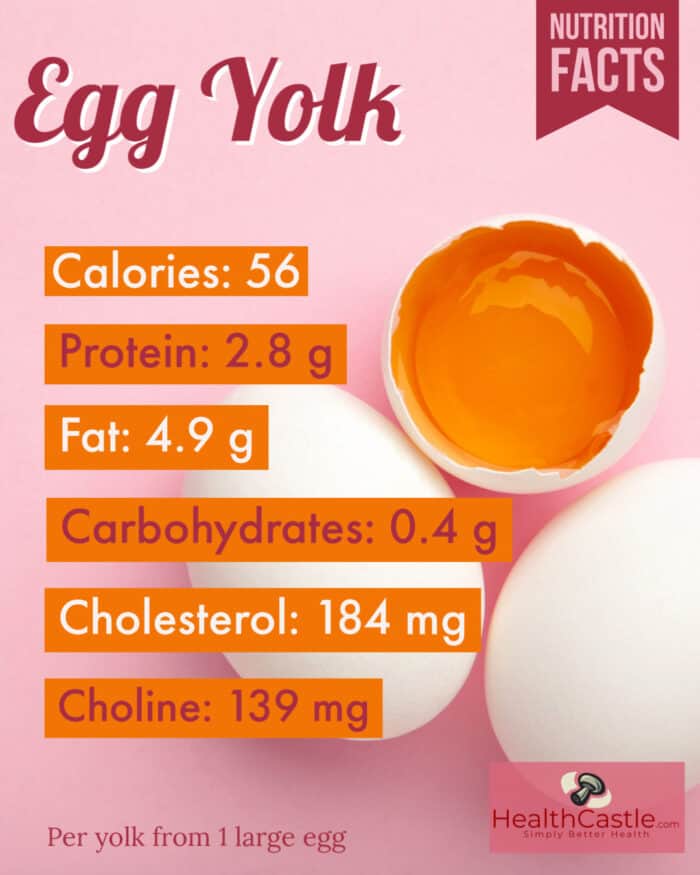
Written By: Gloria Tsang, RD
Title: Founding Registered Dietitian
Alumni: University of British Columbia
Last Updated on:

Whether for health reasons or personal taste preference, some may prefer skipping egg yolk and just eating egg whites. When it comes down to nutritional values, how do they differ?
| Whole Egg (1 Large, 51g) | Egg White (From 1 large egg, 34 g) | Egg Yolk (From 1 large egg, 17g) | |
| Calories | 72 | 17 | 56 |
| Fat | 5 g | <0.1 g | 4.9 g |
| Saturated Fat | 1.6 g | 0 g | 1.6 g |
| Monounsaturated Fat | 2 mg | 0 g | 2 g |
| Polyunsaturated Fat | 955 mg | 0 g | 714 mg |
| Cholesterol | 187 mg | 0 mg | 184 mg |
| Protein | 6.3 g | 3.6 g | 2.8 g |
| Carbohydrate | 0.6 g | 0.2 g | 0.4 g |
| Choline | 147 mg | 0.4 mg | 139 mg |
| Vitamin D | 41 IU | 0 IU | 37 IU |

As you can see from the above table, the majority of the fat content (as well as saturated fat) is in egg yolk. That’s also true for cholesterol. And that is the main reason why people with known risks of cardiovascular diseases may be recommended to restrict egg yolks to 2 times per week.
However, as you remove the yolk, not only do you remove the saturated fat and cholesterol, you also remove other good fats such as monounsaturated fat and polyunsaturated fat. As long as you’re aware of this situation, and supplement your diet with other foods rich in these two fatty acids, that should be ok.
Omega 3-enhanced eggs are popular these days, especially for people who don’t often eat seafood or nuts. Hens fed with a diet high in flax seed produced eggs rich in omega 3. As mentioned above, fats in an egg are found in the yolk, not the white. Therefore, it’s not worth the extra money to pay for omega 3-enhanced eggs, if you don’t eat the yolks.
Eggs are considered to be a complete protein source, providing all 9 essential amino acids. Egg white is an excellent source of protein, providing 3.6 grams of protein each; 80% of the calories indeed comes from protein alone. Furthermore, as egg whites are low in fat, making it a high-protein, low-calorie food.
However, egg white from a single egg does not provide enough protein for breakfast. Therefore, we recommend eating two egg whites in place of an egg.
2x Egg Whites = 1 Whole Egg
2 large egg whites (66 g) provides:
If you’re used to eating 2 whole eggs in the morning, you will need 4 egg whites, providing 14.4 g of protein.
Aside from liver organ meats, no other foods provide as much choline (~140 mg) as an egg yolk. As an essential nutrient, choline plays a critical role in the structural integrity of all cell membranes. In particular, our brain and central nervous system needs choline to help regulate memory, mood, heart beat, DNA synthesis, removing cholesterol from liver, and more.
Most other B vitamins such as B12 and folate as well as all fat-soluble vitamins such as Vitamin A, D, E and K are found in egg yolks.
At one time in history, egg yolks were regarded as the “villain”. As we now know more, both egg whites and yolk have their own nutritional values. Although high in cholesterol, egg yolks also have other beneficial nutrients. If you’re unsure if you can eat egg yolk everyday, check with your doctor or dietitian.
Alumni: University of British Columbia – Gloria Tsang is the author of 6 books and the founder of HealthCastle.com, the largest online nutrition network run by registered dietitians. Her work has appeared in major national publications, and she is a regularly featured nutrition expert for media outlets across the country. The Huffington Post named her one of its Top 20 Nutrition Experts on Twitter. Gloria’s articles have appeared on various media such as Reuters, NBC & ABC affiliates, The Chicago Sun-Times, Reader’s Digest Canada, iVillage and USA Today.
egg white, egg yolk, eggs, nutrition facts